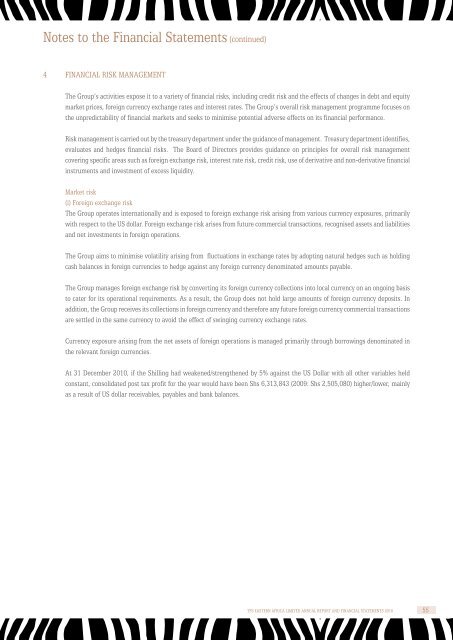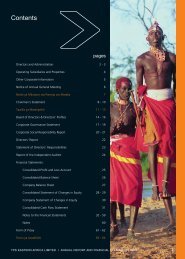TPSEAL 2010 Financial Results. - Serena Hotels
TPSEAL 2010 Financial Results. - Serena Hotels
TPSEAL 2010 Financial Results. - Serena Hotels
You also want an ePaper? Increase the reach of your titles
YUMPU automatically turns print PDFs into web optimized ePapers that Google loves.
Notes to the <strong>Financial</strong> Statements (continued)<br />
4 <strong>Financial</strong> risk management<br />
The Group’s activities expose it to a variety of financial risks, including credit risk and the effects of changes in debt and equity<br />
market prices, foreign currency exchange rates and interest rates. The Group’s overall risk management programme focuses on<br />
the unpredictability of financial markets and seeks to minimise potential adverse effects on its financial performance.<br />
Risk management is carried out by the treasury department under the guidance of management. Treasury department identifies,<br />
evaluates and hedges financial risks. The Board of Directors provides guidance on principles for overall risk management<br />
covering specific areas such as foreign exchange risk, interest rate risk, credit risk, use of derivative and non-derivative financial<br />
instruments and investment of excess liquidity.<br />
Market risk<br />
(i) Foreign exchange risk<br />
The Group operates internationally and is exposed to foreign exchange risk arising from various currency exposures, primarily<br />
with respect to the US dollar. Foreign exchange risk arises from future commercial transactions, recognised assets and liabilities<br />
and net investments in foreign operations.<br />
The Group aims to minimise volatility arising from fluctuations in exchange rates by adopting natural hedges such as holding<br />
cash balances in foreign currencies to hedge against any foreign currency denominated amounts payable.<br />
The Group manages foreign exchange risk by converting its foreign currency collections into local currency on an ongoing basis<br />
to cater for its operational requirements. As a result, the Group does not hold large amounts of foreign currency deposits. In<br />
addition, the Group receives its collections in foreign currency and therefore any future foreign currency commercial transactions<br />
are settled in the same currency to avoid the effect of swinging currency exchange rates.<br />
Currency exposure arising from the net assets of foreign operations is managed primarily through borrowings denominated in<br />
the relevant foreign currencies.<br />
At 31 December <strong>2010</strong>, if the Shilling had weakened/strengthened by 5% against the US Dollar with all other variables held<br />
constant, consolidated post tax profit for the year would have been Shs 6,313,843 (2009: Shs 2,505,080) higher/lower, mainly<br />
as a result of US dollar receivables, payables and bank balances.<br />
TPS EASTERN AFRICA LIMITED ANNUAL REPORT AND FINANCIAL STATEMENTS <strong>2010</strong> 55





